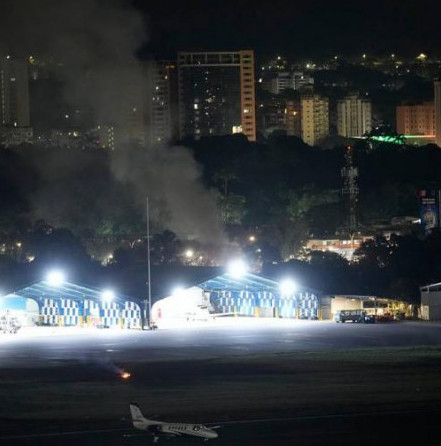The US casualty state in Iraq reached the level of an active military operation, says the influential American newspaper - The Washington Post. The number of US military personnel killed in Iraq since May 1 - the date of the US President’s official announcement of the end of the war, has reached 138 people. Thus, the losses incurred by Americans during the period of active hostilities became equal to the losses incurred during the period of stabilization in the country.
Since May 1, among the fatalities there were not only those who were killed in armed conflicts with the Iraqis, but also victims of diseases, traffic and other accidents. In particular, on August 25, a death of an American soldier serving with the forces in Iraq was caused by "a gunshot wound outside the field of battle". This means that the soldier committed suicide or died as a result of careless handling of weapons. The number of battle casualties of the US Army after May 1 was 62 people. This is significantly less than 115 soldiers killed in Iraq in March and April, but the average number of the armed conflicts victims increases with every passing day. With such a tendency the number of deaths in battle since May 1 by year's end may exceed the number of victims of the active phase of the military operation.
On some days the American army lost three men in a day. The most difficult day for the military was 26 July, when in consequence of an explosion of a grenade thrown by Iraqis, three Americans were killed on the spot, and another American was killed when a military column was under fire from a grenade launcher. The longest period during which the Americans were not suffered from combat losses amounted to 12 days.
A number of episodes of the last Iraq war, including the known story of Private Jessica Lynch captured by Iraqi forces and her several associates, demonstrated the insecurity of American automatic rifles and machineguns in the desert. According to USA Today, American soldiers in Iraq more frequently make use of captured Kalashnikov guns.
This became customary, particularly, in the armored battalion, deployed in the neighbor of the city of Baquba. It is explained by the fact that tank men are short of small arms, and the American assault rifles are often jammed. The government-issue small-arms weapon of a crew of four people in the US tank units consists of four pistols and two M-4 assault rifles. Since in Iraq, the tankers often have to operate outside of their combat vehicles, they prefer to have a rifle or a machine gun each. Lt. Col. Mark Young, commander of a battalion, said he was not against the use of AK-47, but those who wish it, must prove the ability to handle these guns.
Thousands of Shiite muslims staged a demonstration on the evening of August 25 near the headquarters of the US military in Iraq. The demonstrators accused the military of the coalition of failing to provide security in the country. According to the protesters, the Americans do nothing to stop ethnical and religious conflicts. Such unrest was caused by an act of terror, which had been committed last weekend near the house of the Shiites spiritual leader.
The International Committee of the Red Cross (ICRC) will halve its staff in Iraq. It was reported by the ICRC representative in Baghdad Nado Dumani. "We have received not direct threats, but the warnings from various sources that we should be careful, because we can become an attack objective,” she said. It was resolved to reduce staff because this information came from unimpeachable authorities and the recent months have been marked by many tragic accidents. In Iraq, there are currently about one hundred ICRC workers who are rendering humanitarian and medical assistance.
According to Polish sociologists, most Poles – over 50% - are against the participation of the national military contingent in the peace-support mission in Iraq. In addition, 30% of respondents are “definitely against” sending Polish soldiers to the Persian Gulf region, 25% of citizens said they "rather do not support” the military mission. In addition, the number of citizens who express fears that Polish soldiers may become live targets in Iraq is growing monthly. In the latest poll it was reported by 68% of respondents (a month ago - 53%).
The overwhelming majority of Americans - 69% - are afraid that the USA "is held up" in Iraq for many years and that in this case it is unlikely to achieve its goals in this country. Results of the public opinion poll conducted in the USA on request of the Newsweek magazine attest to it.
The survey showed that the Americans are willing to support the presence of the US troops in Iraq, but only if they stay there for a short time. The stay of US troops in Iraq for 1 year will be supported by 84% of American citizens, that for two years - 56%. Only 18 percent of respondents are willing to support the stay of the US troops in Iraq for a period of 3 to 5 years and only 3% are willing to put up with the prospect of the American presence in Iraq for a longer period - from 6 to 10 years.
The poll showed that Americans still have doubt about the effectiveness of the US efforts in Iraq. Only 13% of US citizens are willing to recognize that Washington's efforts to rebuild Iraq yield good results. At the same time, 47% of US citizens express concern that the continuing presence of the US troops in Iraq could lead to an increase in budgetary spending and even further complicate the situation in the American economy. 60% of respondents believe that the USA spends too much money on its military presence in Iraq.
According to the research, over the past four months the support of George Bush's actions in Iraq has fallen in the USA by 20%. If Bush’s position in April was supported by 74% of Americans, now this figure is 54%.
Since May 1, among the fatalities there were not only those who were killed in armed conflicts with the Iraqis, but also victims of diseases, traffic and other accidents. In particular, on August 25, a death of an American soldier serving with the forces in Iraq was caused by "a gunshot wound outside the field of battle". This means that the soldier committed suicide or died as a result of careless handling of weapons. The number of battle casualties of the US Army after May 1 was 62 people. This is significantly less than 115 soldiers killed in Iraq in March and April, but the average number of the armed conflicts victims increases with every passing day. With such a tendency the number of deaths in battle since May 1 by year's end may exceed the number of victims of the active phase of the military operation.
On some days the American army lost three men in a day. The most difficult day for the military was 26 July, when in consequence of an explosion of a grenade thrown by Iraqis, three Americans were killed on the spot, and another American was killed when a military column was under fire from a grenade launcher. The longest period during which the Americans were not suffered from combat losses amounted to 12 days.
A number of episodes of the last Iraq war, including the known story of Private Jessica Lynch captured by Iraqi forces and her several associates, demonstrated the insecurity of American automatic rifles and machineguns in the desert. According to USA Today, American soldiers in Iraq more frequently make use of captured Kalashnikov guns.
This became customary, particularly, in the armored battalion, deployed in the neighbor of the city of Baquba. It is explained by the fact that tank men are short of small arms, and the American assault rifles are often jammed. The government-issue small-arms weapon of a crew of four people in the US tank units consists of four pistols and two M-4 assault rifles. Since in Iraq, the tankers often have to operate outside of their combat vehicles, they prefer to have a rifle or a machine gun each. Lt. Col. Mark Young, commander of a battalion, said he was not against the use of AK-47, but those who wish it, must prove the ability to handle these guns.
Thousands of Shiite muslims staged a demonstration on the evening of August 25 near the headquarters of the US military in Iraq. The demonstrators accused the military of the coalition of failing to provide security in the country. According to the protesters, the Americans do nothing to stop ethnical and religious conflicts. Such unrest was caused by an act of terror, which had been committed last weekend near the house of the Shiites spiritual leader.
The International Committee of the Red Cross (ICRC) will halve its staff in Iraq. It was reported by the ICRC representative in Baghdad Nado Dumani. "We have received not direct threats, but the warnings from various sources that we should be careful, because we can become an attack objective,” she said. It was resolved to reduce staff because this information came from unimpeachable authorities and the recent months have been marked by many tragic accidents. In Iraq, there are currently about one hundred ICRC workers who are rendering humanitarian and medical assistance.
According to Polish sociologists, most Poles – over 50% - are against the participation of the national military contingent in the peace-support mission in Iraq. In addition, 30% of respondents are “definitely against” sending Polish soldiers to the Persian Gulf region, 25% of citizens said they "rather do not support” the military mission. In addition, the number of citizens who express fears that Polish soldiers may become live targets in Iraq is growing monthly. In the latest poll it was reported by 68% of respondents (a month ago - 53%).
The overwhelming majority of Americans - 69% - are afraid that the USA "is held up" in Iraq for many years and that in this case it is unlikely to achieve its goals in this country. Results of the public opinion poll conducted in the USA on request of the Newsweek magazine attest to it.
The survey showed that the Americans are willing to support the presence of the US troops in Iraq, but only if they stay there for a short time. The stay of US troops in Iraq for 1 year will be supported by 84% of American citizens, that for two years - 56%. Only 18 percent of respondents are willing to support the stay of the US troops in Iraq for a period of 3 to 5 years and only 3% are willing to put up with the prospect of the American presence in Iraq for a longer period - from 6 to 10 years.
The poll showed that Americans still have doubt about the effectiveness of the US efforts in Iraq. Only 13% of US citizens are willing to recognize that Washington's efforts to rebuild Iraq yield good results. At the same time, 47% of US citizens express concern that the continuing presence of the US troops in Iraq could lead to an increase in budgetary spending and even further complicate the situation in the American economy. 60% of respondents believe that the USA spends too much money on its military presence in Iraq.
According to the research, over the past four months the support of George Bush's actions in Iraq has fallen in the USA by 20%. If Bush’s position in April was supported by 74% of Americans, now this figure is 54%.


